Faisal Islam: The big problem facing whoever wins the election
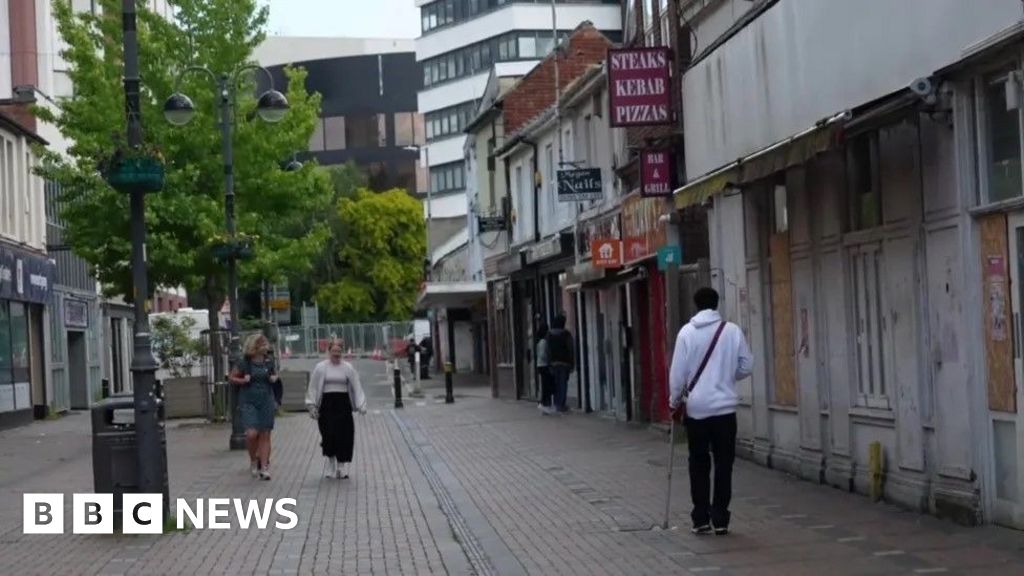
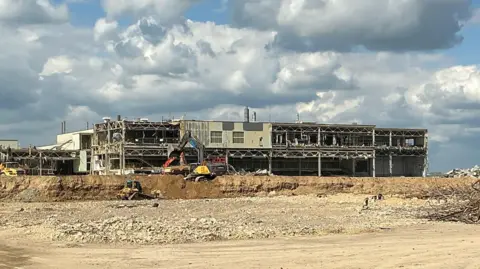 Getty Images
Getty Images Amid a vast expanse of rubble, dust and noise, a green crane yanks away at a corrugated roof like a frustrated dentist attempting to extract a particularly stubborn wisdom tooth.
Swindon’s Honda factory – once one of the world’s most advanced car factories – is being demolished, three decades after it opened.
This used to be one of the fastest-growing towns in Europe. It was one of the jewels in the crown of investments attracted to the UK by Margaret Thatcher’s brand of 1980s enterprise. Swindon voted for her, John Major, Tony Blair, David Cameron, Theresa May and Boris Johnson. It was also one of the first towns to declare for Brexit, by 55%.
But last year, its council changed hands to Labour. The council has had to continue to accelerate cuts to local services, passing a budget with record cuts in order to stave off bankruptcy.
Inflation, rising care expenses, and central government grant squeezes meant cuts to libraries, the Dial-a-Ride community transport service and dimmed street lights. There has been an almost 5% rise in council tax. The council leader has warned any further cuts will affect frontline services.
What is happening in Swindon is a visible consequence of sluggish long-term economic growth. Government spending cuts, low private investment, deindustrialisation and shrinking disposable income have left scars even on what was one of the UK’s famous boom towns.
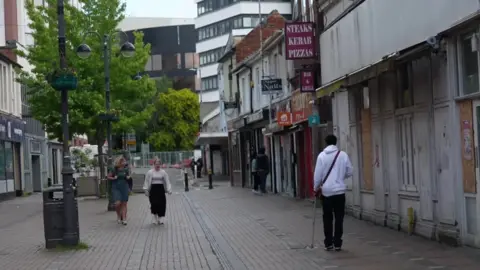
The Honda site is set to become a warehousing and logistics facility. In another world, it would have been replaced by another major global manufacturer. Tesla, for example, was invited. Whereas five years ago the promise was to level up left-behind Northern towns, places like Swindon feel levelled down.
The question about growth arising in this town is vital to whoever wins Thursday’s election.
Elsewhere in the world, sites like this are being repurposed for electric car manufacturing. The Americans are pouring public money into their factories to try to compete with China, who will soon be confirmed as the world’s biggest car exporter. Emerging economies from Indonesia to Vietnam to Turkey are also investing in and growing their car industries.
Indeed it was to Turkey that the entire Honda production line, including dozens of never-used industrial robots, was packed up and shipped off via the M4 and Bristol port last year.
Swindon is not just about Honda. It is part of the M4 corridor where there are plenty of jobs in the knowledge sectors, and in finance, for example at the headquarters of Nationwide. The overall unemployment rate is just 2.6%, but the number of people not in work and not looking for work is 18%.
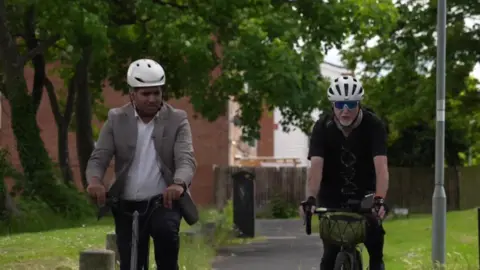
Marcus Kittridge, a former Honda engineer who now runs a cafe in the centre of town with his wife Tracey, accepts there are still “good employment prospects” but says many are at or “50p above” minimum wage, and says this has contributed to a decline in disposable income in the centre of town. “It’s like a Northern town that lost its industry in the 1970s,” he tells me.
They now shut the cafe at 14:00 every day because of the high price of energy. He expects to be passing on his rising costs in higher prices for the next year or two. They have also stopped selling smoothies, after a notable decline in the availability and quality of fresh fruit, which they blame on post-Brexit changes.
“We were told the quality of food was going to go up after Brexit, I can tell you now it has not. I’ve barely heard any politician mention it, but it definitely has had an impact on us,” Tracey says.
Might she have been a bit unlucky with her purchases of fresh produce? “If I’m unlucky, I’m getting unlucky every single day and I’m probably the unluckiest person on earth,” she says.
Their experience shows that some of the undercurrents of sluggish long-term growth – high energy prices, low disposable income, low investment, and new trade barriers can combine in unusual ways.
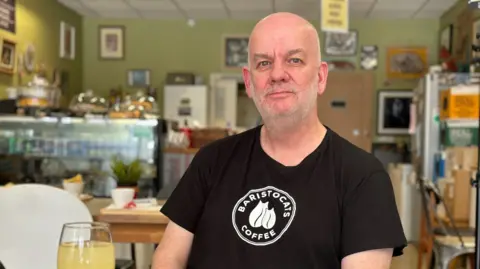
Gary Huett, a retired graphic designer also from Swindon who got in touch as part of the BBC’s Your Voice, Your Vote project inviting you to tell us what matters, wanted to know why Swindon’s town centre looked like it was “rotting” and asked if anything could change.
“We’ve now got pound shops predominantly, and the thriving night scene, packed with the yuppy set in the 1980s and 1990s has gone and decayed.”
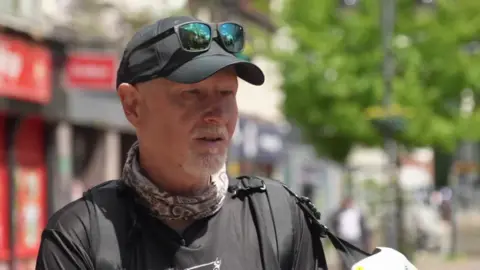
The Conservatives say green shoots are already here. The latest growth figures for January to March show the UK now has the fastest growing economy in the G7 group of advanced economies, after last year’s brief recession. Swindon’s jobs record remains strong. On the Honda site, new investment has come, and the jobs, albeit in warehousing rather than manufacturing, will return.
For Labour, Swindon – a bellwether town where residents have voted the same way as the eventual national winner for the last 40 years – shows that there are no quick fixes.
They are not competing with the US or European Union (EU) with big public investments in green energy. Council spending remains unprotected and subject to the same ongoing squeeze. A looser planning regime might help build more houses or expand the solar farms that dot the countryside around the town. But the job of transformation is very real. When asked what will happen if the economy does not grow, Labour has responded by saying some variation of “I’m not defeatist” or “we can do it”.
When I interviewed shadow chancellor Rachel Reeves in Swindon, I said that if she was relying on planning changes to transform growth prospects, they were going to have to be a revolutionary, almost Thatcher-style “Big Bang”. She told me: “It’s big reform we are offering… unless we grow the economy we’re going to be stuck in a doom loop of low growth, high taxes and poor public services.”
Labour’s hope is that there is a tsunami of private investment that has been held back from this country due to political and economic instability. That, the party says, can be unleashed by the tens of billions with a strong and stable pro-growth government.
When I met Chancellor Jeremy Hunt on the same day in Surrey, he said the party’s focus was now on bringing tax – which his party had hiked to seven-decade highs – down.
“We put up taxes because we were helping families in the cost-of-living crisis. We were very honest about that, it was the right thing to do.
“The difference is we don’t think it has to be permanent, and we are prepared to do the hard work to bring taxes down because we know a more competitive economy will see more growth and then more money for the NHS and schools.”
Whoever is in Number 11 after the election, Swindon shows the massive task facing them.
It shows what an economy not growing at normal rates looks like. A former boom town struggling. The challenge is not just to deliver robust economic growth here and well beyond, but to make sure this renewal is visible to the likes of Gary, Tracey and Marcus here in Swindon and to others like them across the country.
You can find a full list of candidates for the Swindon North constituency here, and those for the Swindon South constituency here.
Related
Why investing in women is a vital next step for…
Get Nadine White's Race Report newsletter for a fresh perspective on the week's newsGet our free newsletter from The Independent's Race CorrespondentGet our fre
Business secretary signals major shift on electric car policy to…
In a determined effort to retain Nissan’s manufacturing presence in Britain, Business Secretary Jonathan Reynolds has vowed to implement “substantial c
Joint Statement: Business Secretary and Fujitsu Services Ltd
Business and Trade Secretary Jonathan Reynolds today (Friday 7 March) met chiefs for Fujitsu in Tokyo to begin talks over the cost of redress for victims of th
UK foreign secretary backs multilateral defence funding for Europe
UK foreign secretary David Lammy has said that a new multilateral fund will be needed to secure Europe’s defence as he confirmed that Britain is “open to”














